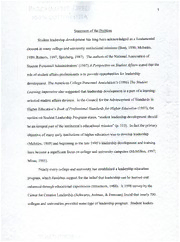Table Of ContentPSYCHOLOGICALTYPEANDLEADERSHIPCHARACTERISTICS
OFWOMENSTUDENTLEADERS
By
TRACEYELIZABETHREEVES
ADISSERTATIONPRESENTEDTOTHEGRADUATESCHOOL
OFTHEUNIVERSITYOFFLORIDAINPARTIALFULFILLMENT
OFTHEREQUIREMENTSFORTHEDEGREEOF
DOCTOROFPHILOSOPHY
UNIVERSITYOFFLORIDA
->'"x>»reN;;. 2001
Copyright2001
TraceyElizabethReeves
>*>T*i
Igiwvoeunlmdeliuknectoonddietdiiocnaatleltohvisewaonrdksutpopmorytpianrealnltso,fMmaycenadnedavBoertst.yReeves,whohavealways
ACKNOWLEDGMENTS
Manyindividualswereinstrumentalinthecompletionofthisundertakingandare
deservingofspecialrecognition.
SincereappreciationisextendedtoDr.MaryF.Howard-Hamilton,chairofmy
committee,forherguidanceandpatienceduringthewritingofthisdissertation.Shewas
instrumentalinhelpinggeneratearesearchtopicandincritiquingmyworkthroughout
theprocess.Gratitudeisalsoextendedtomycommitteemembers.Dr.PhyllisMeek,Dr.
JamesPitts,andDr.ArtSandeen,whohelpedandguidedmethroughthisprocess.
Aspecialthankyouisgiventomysupervisorsovertheyears,JimGrimm,Norb
Dunkel,andLisaDiekow,aswellasmycolleagues,fortheirsupportwhileIworkedon
thisproject.IamgratefultothestaffintheMurphreeArea,especiallytheResidence
Directors,JaniceGerweck,RobertoCarrero,andScottFrancis,fortheirpatienceand
understanding.
SpecialacknowledgmentisduetoJenniferFordandLisaWertzfortheir
assistanceduringdatacollectionandtoScottBumsforprovidingstatisticalskills.
Thanksareextendedtothemanywomenstudentleaderswhotookthetimeto
completetheinstrumentsforthisstudy.Ihavelearnedfromallthem.
MyheartfeltthanksaregiventomybrotherWinReevesandhisfamily:Kathy,
andTori,mysisterDebbieMcElveyandherfamily:Mac,Leslie,andMicheil,butmost
ofalltomyparents,MacandBettyReeves,whothroughtheirloveandnurturancehave
mademethepersonIam.
TABLEOFCONTENTS
ACKNOWLEDGMENTS >v
LISTOFTABLES viii
ABSTRACT «
CHAPTERS
IINTRODUCTION 1
Overview 1
TheoreticalFramework 3
StatementoftheProblem 5
NeedfortheStudy 6
PurposeoftheStudy 9
RationaleforApproachtotheStudy 9
RDeefsmeiatricohnQsuoefstTieornmss 1H0
OverviewfortheStudy 14
IIREVIEWOFTHERELATEDLITERATURE 15
LeadershipTheories 15
Women'sLeadership 22
ResearchonTypeandLeadership 28
Myers-BriggsTypeIndicator 30
StudentLeadershipPracticesInventory 34
Summary 36
IIIMETHODOLOGY 39
Overview 39
Population 39
SamplingProcedures 40
ResearchProcedures 41
Hypotheses 42
ResearchQuestions 42
AssessmentInstruments ^"^
DemographicInventory
Myers-BriggsTypeIndicator '*3
ResSetaurdcehntDeLseiagdnerasnhdipDaPtraactAincaelsysIinsventory 4456
Limitations 48
Summary 49
IVRESULTS 50
Hypotheses 5"
ResearchQuestions 5'
ResultsandAnalysis 51
DemographicInformation 51
HypothesisOne 53
HypothesisTwo 55
HypothesisThree 56
HypothesisFour 56
ResearchQuestionOne 57
ResearchQuestionTwo 5^9
Summary
VDISCUSSION 61
Limitations 61
Summary 62
Hypotheses 62
ResearchQuestions 62
PsychologicalTypeandLeadershipPractices 62
TypeofLeadershipExperience 63
GenderCompositionofOrganizationalMembership 63
LengthofLeadershipExperience 63
Conclusions 63
Implications 67
Recommendations 71
APPENDICES
AAPPROVALOFPROTOCOLFROMTHEUNTVERSITYOFFLORIDA
INSTITUTIONALREVIEWBOARD 73
BCONTACTLETTERFORPARTICIPATION 75
CINFORMEDCONSENTFORM 76
DDEMOGRAPHICINVENTORY 77
ELETTEROFPERMISSIONTOUSETHEMYERS-BRIGGSTYPE
INDICATOR "^8
FSAMPLEQUESTIONSFROMTHEMYERS-BRIGGSTYPEINDICATOR.... 81
GLETTEROFPERMISSIONTOUSETHESTUDENTLEADERSHIP
PRACTICESINVENTORY 84
HQUESTIONSFROMTHESTUDENTLEADERSHIPPRACTICES
INVENTORY 86
REFERENCES 89
BIOGRAPHICALSKETCH 102
.
LISTOFTABLES
Table
1. Age-WomenStudentLeaders 51
2. Racial/EthnicBackground-WomenStudentLeaders 52
3. CurrentCollegeClassification-WomenStudentLeaders 52
4. TypeofLeadershipPosition-WomenStudentLeaders 53
5 GenderCompositionofOrganizationalMembership-WomenStudent
Leaders 53
6. PearsonCorrelationsofPsychologicalTypeandLeadershipPractices 54
7. EffectsofPsychologicalTypeonLeadershipPractices(ANOVA) 54
8. Chi-SquareValuesfromLogisticRegressionAnalysisforTypeofLeadership
Position-Employee 55
9. PearsonCorrelationsofGenderCompositionofOrganizational
Membership 56
10.PearsonCorrelationsofLengthofLeadershipExperience 57
11.PsychologicalTypesofWomenStudentLeadersandSampledPopulationof
WomenCollegeStudents 58
12.MeansofLeadershipPracticesforWomenStudentLeadersandSampled
PopulationofWomenStudentLeaders 59
AbstractofDissertationPresentedtotheGraduateSchool
oftheUniversityofFloridainPartialFulfillmentofthe
RequirementsfortheDegreeofDoctorofPhilosophy
PSYCHOLOGICALTYPEANDLEADERSHIPPRACTICES
OFWOMENSTUDENTLEADERS
By
TraceyElizabethReeves
August2001
Chair:MaryF.Howard-Hamilton
MajorDepartment:EducationalLeadership,Policy,andFoundations
Thepurposeofthisstudywastoassesstherelationshipbetweenself-perceptions
ofpsychologicaltypeandempoweringleadershippracticesofwomenstudentleaders.
Whiletherehasbeenmuchresearchonwomen'seffectivenessasleaders,onlyinthelast
decadehasthefocusturnedtothedevelopmentoftransformationalleadership.
Participantsinthisstudywere200womenstudentleadersatamajorpublic
researchuniversity.TheMyers-BriggsTypeIndicator,FormM(MBTI),wasusedto
studypsychologicaltypesanddynamics.TheStudentLeadershipPracticesInventory
(StudentLPI)wasusedtomeasuretheempoweringleadershippracticesof"challenging
theprocess,""inspiringasharedvision,""enablingotherstoact,""modelingtheway,"
and"encouragingtheheart."Ademographicinventorysolicitedadditionalinformation
includingtypeofleadershipposition,gendercompositionoforganizationalmembership,
andlengthofleadershipexperience.Datawereanalyzedusingdescriptivestatistics
&
(means,standarddeviations,frequencies,andpercentages),correlation,analysisof
variance(ANOVA),andlogisticregression.
Theresultsrevealedsignificantstatisticalsupportforarelationshipbetween
psychologicaltypeandleadershippractices.Relationshipswerealsodemonstrated
betweenleadershippracticesandtypeofleadershipexperience,gendercon^ositionof
organizationalmembership,andlengthofleadershipexperience.
ThemostcommonpsychologicaltypesinthesamplewereENFP(20%)and
ENFJ(18.5%).Similaritieswerefoundincomparingthemeansforthesampleoneach
oftheleadershippracticessubscaleswithsamplepopulationsfrompreviousresearch.
"Challengingtheprocess"isconsistentlythelowestsubscale,while"encouragingthe
heart"and"enablingotherstoact"wereconsistentlythestrongestpractices.
Recommendationsforfutureresearchincludesconcentratingonwomenstudent
leadersatdifferenttypesofhighereducationinstitutions,theinteractionofgenderand
race/disabilities/religion/sexualorientation,womenleadersinpredominatelymale
organizations,"whole"four-lettertype,followers'perceptionsofempoweringleadership,
andreasonsbehindthelowratingfor"challengingtheprocess."
s;;'-«-v

